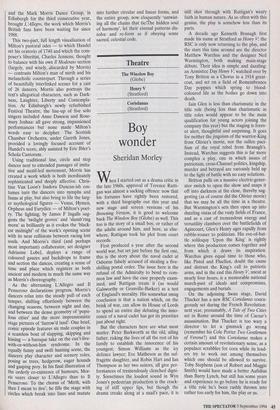Theatre
The Winslow Boy (Globe)
Henry V (Stratford) Coriolanus (Stratford)
Boy wonder
Sheridan Morley
hen I started out as a drama critic in the late 1960s, approval of Terence Ratti- gan was almost a sacking offence: now that his fortunes have rightly been restored, with a third biography out this year and new stage and screen versions of his Browning Version, it is good to welcome back The Winslow Boy (Globe) as well. This too is the story of a small boy, or rather of the adults around him, and here, as else- where, Rattigan took his plot from court records.
First produced a year after the second world war, but set just before the first one, this is the story about the naval cadet at Osborne falsely accused of stealing a five- shilling postal order. The issue here is the refusal of the Admiralty to bend to com- mon law and have the case properly exam- ined, and Rattigan treats it (as would Galsworthy or Granville-Barker) as a test of England's morality. His somewhat smug conclusion is that a nation which, on the brink of war, can allow its House of Lords to spend an entire day debating the inno- cence of a naval cadet has got its priorities just about right.
But the characters here are what most matter. Peter Bark-worth as the old, ailing father, risking the lives of all the rest of his family to establish the innocence of his youngest; Simon Williams as the icy defence lawyer; Eve Matheson as the suf- fragette daughter, and Robin Hart and Ian Thompson as her two suitors, all give per- formances of tremendously clenched digni- ty. Sometimes the loudest sound in Wyn Jones's pedestrian production is the crack- ing of stiff upper lips, but though the drama creaks along at a snail's pace, it is still shot through with Rattigan's weary faith in human nature. As so often with this genius, the play is somehow less than its parts.
A decade ago Kenneth Branagh first made his name at Stratford as Henry V: the RSC is only now returning to the play, and the stars this time around are the director Matthew Warchus and the designer Neil Warmington, both making main-stage debuts. Their idea is simple and dazzling: an Armistice Day Henry V, watched over by Tony Britton as a Chorus in a 1914 great- coat, and set on a field of Remembrance Day poppies which spring to blood- coloured life as the bodies go down into death.
lain Glen is less than charismatic in the title role (being less than charismatic in title roles would appear to be the main qualification for young actors joining the company this year) but the staging is forev- er alert, thoughtful and surprising. It goes for neither the jingoism of the warrior-King from Olivier's movie, nor the sullen paci- fism of the royal rebel from Branagh's. Instead, Warchus suggests this is far more complex a play, one in which issues of patriotism, cross-Channel politics, kingship, murder and betrayal are variously held up to the light of battle with no easy solutions.
Britton pulls on a massive electric-gener- ator switch to open the show and snaps it off into darkness at the close, thereby sug- gesting (as of course did the Olivier movie) that we may be all the time in a theatre. But Warmington's sets then open up into dazzling vistas of the vasty fields of France, and as a cast of tremendous energy and versatility clambers over the battlefields of Agincourt, Glen's Henry ages rapidly from rabble-rouser to politician. His eve-of-bat- tle soliloquy 'Upon the King' is rightly where this production comes together and from which it draws its inspiration. Warchus gives equal time to those who, like Pistol and Fluellen, doubt the cause and distrust the King's call to patriotic arms, and in the end this Henry V, uncut at nearly four hours, is a memorable national march-past of ideals and compromises, engagements and burials.
On the adjoining Swan stage, David Thacker has a new RSC Coriolanus coura- geously set during the French Revolution: next year, presumably, A Tale of Two Cities set in Rome around the time of Caesar's assassination. But Thacker is too wary a director to let a gimmick go wrong (remember his Cole Porter Two Gentlemen of Verona?) and this Coriolanus makes a certain amount of revolutionary sense, as a populace scrabbles for corn while its lead- ers try to work out among themselves which one should be allowed to survive. Toby Stephens (son of Robert and Maggie Smith) would have made a better Aufidius than Barry Lynch, but still has some years and experience to go before he is ready for a title role he's been rashly thrown into rather too early for him, the play or us.


























































 Previous page
Previous page